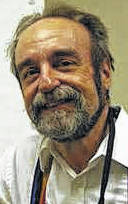
By Tom Burns
Stargazing
As those clear, 7-year-old eyes stared up at me at a Perkins Observatory public program, I knew I was in trouble. “Why don’t you talk more about aliens?” he said.
Here is the answer I gave him: “We know a lot about the stars and planets. We don’t know much about aliens. We don’t even know if there are aliens. I like to talk about the things we know something about.”
Here is the answer I wanted to give:
Hovering brightly in the sky is a star, so close that it seems we could almost touch it.
However, the universe is immense beyond our imaginings. Given the current level of technology, many generations will pass before we get there. Even a simple star is beyond our reach.
So, we hope those places can come to us in the form of far more intelligent races. If those beings are good, they will solve our Earthly problems. If they are evil, they will unite us in our quest to defeat them. In that unity, we will solve our problems on our own.
We have worked ourselves to the brink of annihilation several times in the past century, partly because we cannot overcome our instinctual desire to survive by competing with other tribes for power and resources. Will we harness our animal nature with our intelligence and survive into the 22nd century?
It would be comforting to know that some extraterrestrial culture out there managed to think through their own self-destructiveness to survive into old age.
As a conscious species, we are a part of the universe awake to and aware of its larger self, the universe.
In a sense, that makes us the mind of the cosmos. If we are the only such species, that great power becomes an even greater responsibility, even a burden.
In short, humans care about aliens because we feel alone and isolated in a vast, universal wasteland.
And thus, we will, against all odds, continue listening and hoping to hear the faint voice of others who survived their growing pains.
However, we are also rational beings. We know that many of our fellow humans want us to believe what they believe. We are bombarded by clever requests to buy into all manner of commercial, moral, political, and intellectual messages. We know that the consequences of believing an untruth can be catastrophic to our mental, physical, and social well-being.
We want some simple truth to solve our problems, but the truth is rarely simple. So many people want us to believe things for their benefit, not ours.
If we are wise, we develop a healthy skepticism. We wonder if one fast food hamburger is really better than another or if dousing ourselves with expensive cologne will really make us more attractive.
We should do the same with ideas. We must ask hard questions about groups that draw us in with alluring ideas and then demand our total allegiance. Fast food companies and ideological cults certainly want our money, but more frighteningly, they sometimes want our minds.
If we are wise, we demand compelling evidence for any proposition before we believe it.
If we are wise, we choose foods according to their healthiness. We must apply the same rigor to ideas. We must carefully evaluate ideas before we let them absorb our lives.
Thus, I don’t talk much about aliens because I don’t know whether the universe is populated with intelligent civilizations. And, odds are, I probably will never know.
I prefer to spend my ever-decreasing time on our planet thinking about the miracles that we know, and here is one of them:
As I stared into those clear, 7-year-old eyes, I realized that a mind, full of promise, exists behind them. We have discovered an intelligent race in the universe — the human race.
We are not alone in the vastness. We have each other. We must nurture the intelligence of the next generation — and the one after that. We must show them the richness of their universe and their place in it.
In those eyes — and not in some visitor from beyond — is our greatest hope and our most promising escape from the unspoken fears that haunt our lives.
Tom Burns is the former director of the Perkins Observatory in Delaware.

